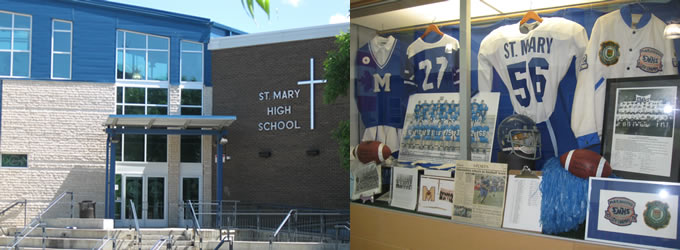-

"Don't bunt. Aim out of the ball park. Aim for the company of immortals." ~ David Ogilvy
-

"Be ready when opportunity comes. . . Luck is the time when preparation and opportunity meet." ~ Roy Chapin
-

-

"Formal education will make you a living; self-education will make you a fortune." ?~ Jim Rohn
"The only person who is educated is the one who has learned how to learn and change." ~ Carl Rogers
"It takes courage to grow up and become who you really are." ~ e.e. cummings
-

July 18, 2025
Terminology
Below is a list of commonly used words that you will encounter when you begin to research universities and colleges.
Tuition & Fees – The prices charged to students to enroll in classes, including any fees that are required as a part of enrollment. These fees can be charged per class, per credit hour, or per semester.
Admissions Office – The office on a college campus which houses the people who recruit, interview and admit students to the college.
Post-Secondary– This is education after high school- i.e. high school is secondary education and post-secondary educational institutions are thus universities, colleges, technical schools, or language schools, etc.
Undergraduate- This is the first level of study at university, this is, you are an undergraduate when you first enter university- i.e. until you graduate- you may then enter a graduate school for a 2nd or 3rd degree, often a Master’s or Doctorate program
Universities and Colleges, – Universities tend to offer only degrees- i.e. four-year Bachelors of Arts, Bachelors of Science, Bachelors of Engineering;
Colleges and Technical schools –may offer degrees as well as diploma programs- often 2 years of study in a field or area of your choice.
University Faculty– This is an area of studywithin a university, for example- U of Regina has the following faculties: engineering, science, education, kinesiology, business, journalism and fine arts….
University Program or Major– This is a specific subject or major within a university faculty- for example within the faculty of fine arts there are often programs of art, art history, dance, drama and music.
Prerequisite- A subject required for a specific area of study at university or college. For example MathB30 is required for entrance into the SIAST Business Administration program and University of Regina Business program.
Transcript- Official academic records detailing place and time of study, courses completed and grades achieved. In order to finalize the admittance process to a university or college, a transcript must be sent by the student prior to the beginning of school.
Apprenticeship- Apprenticeship is a system of training and certification in a trade. Based on the needs of the industry, apprenticeship involves a formal agreement between an employee who wants to learn a skill and an employer who needs a skilled worker.
Trade– Plumbing, carpentry, electrician, hairstylist, automotive service technician, meat cutter etc…….
Scholarship- financial aid provided to a student on the basis of academic merit. Some scholarships may include other criteria such as extracurricular involvement, leadership, volunteer experience etc. Scholarships may be available through specific universities and colleges and others may be available through private corporations, individual donors and charities.
Bursary– Bursaries are based primarily on financial need. Some bursaries may include other selection criteria such as extracurricular involvement, leadership, etc. Bursaries are meant to supplement, not replace, students’ primary sources of funding which may come from other provincial financial assistance programs, employment income, and parental/spousal contributions.
Student Loan – sum of money that must be repaid. Loans to university students are obtained through the government.
University of Regina – Commonly Used Terms
Good Academic Standing – For award purposes the term Good Academic Standing is a CGPA (Cumulative Grade Point Average) of 60%.
Academic Achievement – Unless otherwise stated, academic achievement means an average of 75% or higher. An explanation of how averages are calculated can be found in the next section.
Direct Entrance – When an entrance award requires “Direct entrance from high school,” applicants must be applying for admission to the next semester after high school graduation; usually this means they are graduating in June and applying to the next fall semester which begins in September. Applicants are also considered to be coming directly from high school if they apply for admission to the fall semester after graduating in the immediately preceding December or January.
Disability –Students who are unable, because of a disability, to register in the minimum credit hours stated in a scholarship’s terms of reference, may nevertheless be eligible for consideration if their maximum course load is specified and documented by a professional qualified to assess their disability. Students must have been registered with, and their documentation must have been provided to and verified by, the University of Regina’s Disability Resource Office at the start of each semester during which the student may be considered for a scholarship or bursary.
Financial Need – When financial need is a criterion for an award, applicants must supply a statement of their projected costs and income. More information is given on application forms.
Registration – Unless otherwise stated, a requirement to be “registered in…” indicates the minimum number of credit hours the recipient of an award must be registered in throughout the semester in which the scholarship is paid. Registration must be processed and finalized by the last day to drop classes.
Residence – Unless otherwise stated, a requirement to be “resident in …” means that the candidate must have lived in the stated location for a minimum of twelve consecutive months immediately preceding the date of application for the award.
Year of Study – the descriptions of undergraduate scholarships and bursaries refer to “year of study.” Unless otherwise stated, this should be interpreted as follows:
Year 1: students who successfully completed 0-23 credit hours
Year 2: students who successfully completed 24-53 credit hours
Year 3: students who successfully completed 54-83 credit hours
Year 4: students who successfully completed 84-113 credit hours
Year 5: students who successfully completed 114-143 credit hours
Beyond 5th year: students who have successfully completed 144 or more credit hours
When certification is required, the University certifies total credit hours successfully completed, including credit hours that may be extra to the current program.

